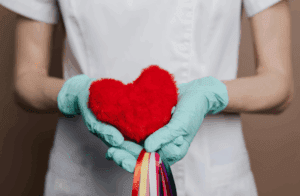
Summer offers sunshine, longer days, and outdoor fun, but it also brings heatwaves that can be tough on your heart. The intense July temperatures can pose significant health risks, especially for those with existing heart conditions. Follow these essential tips to keep your heart healthy and safe during the summer heat.
- Stay Hydrated
- Dehydration adds extra stress to your heart. Aim to drink at least eight glasses of water daily, more if you’re active or sweating. Limit caffeinated and alcoholic beverages as they can cause dehydration.
- Avoid Peak Sun Hours
- Schedule outdoor activities during the cooler parts of the day, like early morning or late evening. Between 10 a.m. and 4 p.m., the sun’s rays are strongest, and the heat is most intense.
- Dress Appropriately
- Wear light, breathable clothing in light colors to help your body regulate its temperature. Use a wide-brimmed hat and sunglasses to protect your face and eyes from the sun.
- Take It Easy
- If you’re not accustomed to exercising in the heat, start slowly and gradually increase your activity level. Listen to your body and take breaks as needed. Overexertion can lead to heat exhaustion or heat stroke, which put extra stress on your heart.
- Stay Cool
- Spend as much time as possible in air-conditioned environments. If you don’t have air conditioning at home, visit public places like malls, libraries, or community centers. Use fans, take cool showers, and apply cold compresses to your neck and wrists to help keep your body temperature down.
- Monitor Your Health
- Keep an eye on your blood pressure and heart rate, especially if you have a heart condition. If you experience symptoms like chest pain, shortness of breath, or dizziness, seek medical attention immediately.
- Eat Light
- Opt for smaller, more frequent meals instead of heavy, large ones. Focus on fresh fruits, vegetables, and lean proteins that are easier for your body to digest and don’t generate as much body heat.
- Know the Signs of Heat-Related Illnesses
- Be aware of the symptoms of heat exhaustion and heat stroke. Heat exhaustion symptoms include heavy sweating, weakness, cold or clammy skin, a fast but weak pulse, and nausea or vomiting. Heat stroke symptoms include a high body temperature (above 103°F), hot and dry skin, a rapid and strong pulse, and possible unconsciousness. Seek immediate medical help if you or someone else shows signs of heat stroke.
By following these precautions, you can enjoy the summer while keeping your heart safe and healthy. Remember, your heart works hard to keep you going, especially in the heat, so give it the care and attention it deserves.
Stay cool, stay safe, and have a heart-healthy summer!





